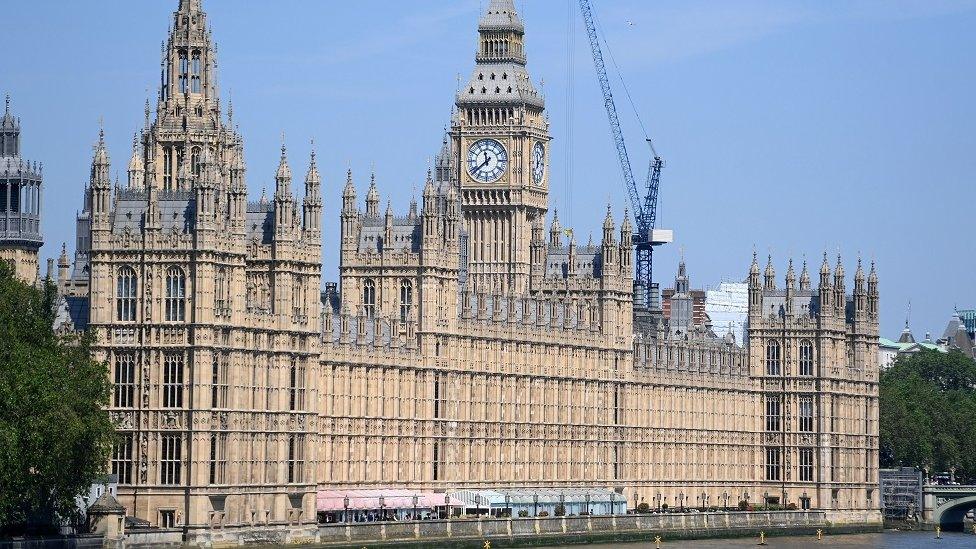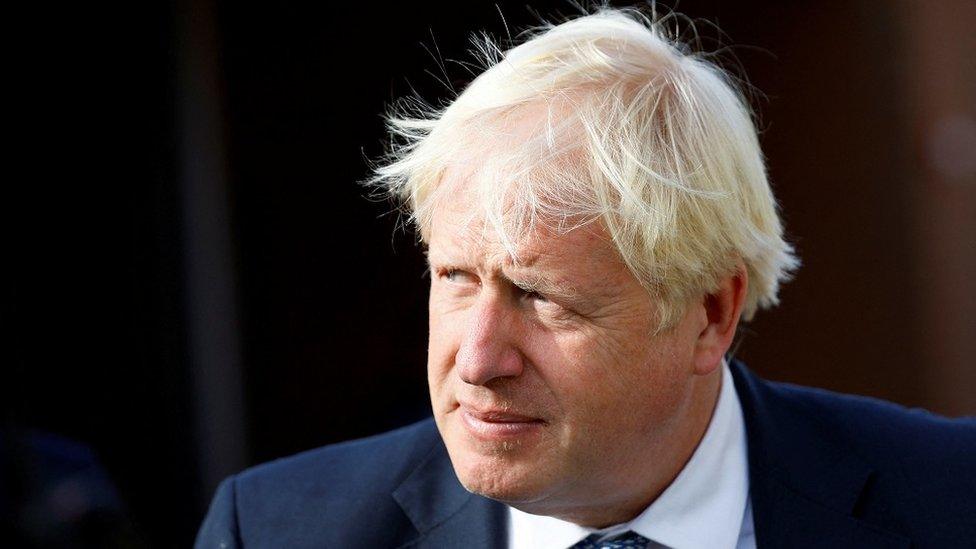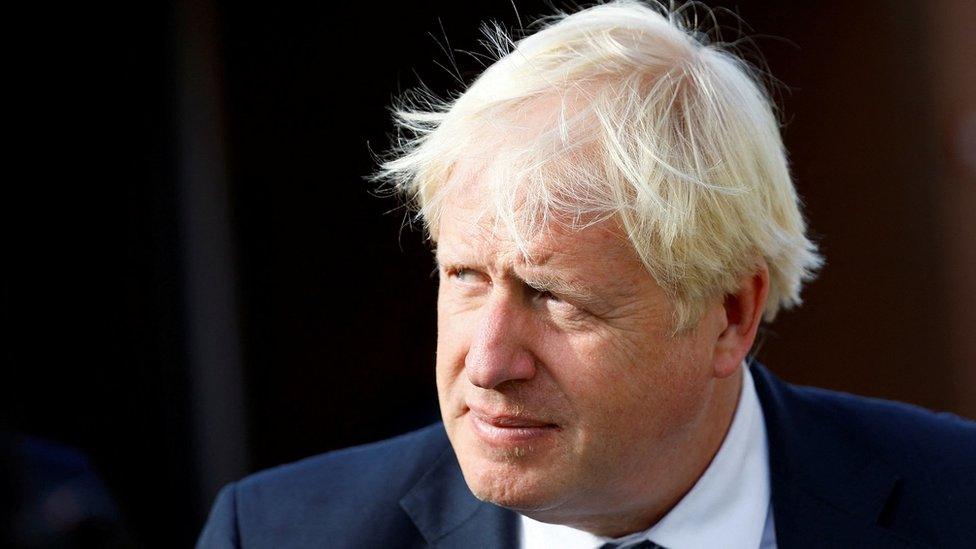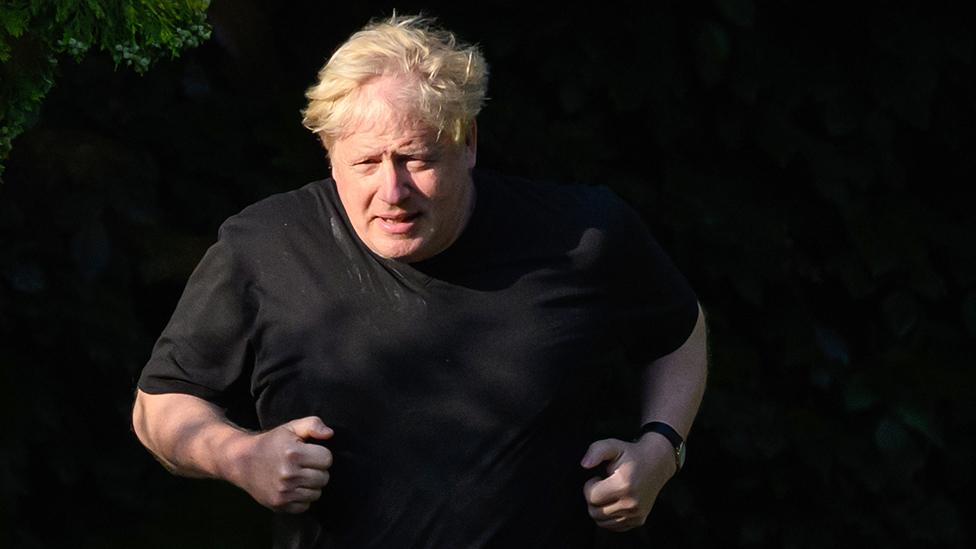What's happening in Parliament this week?
- Published

This week law-making takes second place to the vote on sanctions against Boris Johnson, in the wake of the Commons Privileges Committee's scathing report, which found he had deliberately and repeatedly misled the Commons.
Punishments against MPs are normally proposed by the Standards Committee, as in the recent case of Margaret Ferrier. Then voted on without debate. But because this is a recommendation from the Privileges Committee, there will be a debate.
There had been talk that the government would propose a neutral "take note" motion, rather than one to accept the recommendations. But in that event, the Speaker would almost certainly have allowed an amendment to implement them.
And because this motion will be amendable, keep an eye out for changes proposed by Johnson supporters to defang the motion.
Although there's now talk that no votes will be forced, because it may prove to be in a lot of Conservative MPs' interests not to be recorded voting one way or another.
MPs who do speak will need to tread carefully; the word is that Mr Speaker will very quickly shut down anyone who starts talking about "Kangaroo Courts" or who attacks the Chair, Harriet Harman, or other Committee members.
Despite the political heat this may be a relatively short debate. And as a "House Matter" it will not be subject to the usual party whipping, which may allow many MPs to simply stay away.
Some may have genuine prior engagements - the Defence Committee is going ahead with a long-planned visit to the Portsmouth naval base. But others will simply be avoiding a difficult choice.

MPs will be asked to approve the recommendations of the Privileges Committee, which found he had deliberately and repeatedly misled the Commons
There is plenty of significant legislating, however, particularly in the Lords. Peers' long march through detail of the Online Safety Bill reaches another milepost. And several bills continue their pinging and ponging between the two houses of Parliament, as MPs and Peers settle the final crucial details.
Similarly, there's plenty of interesting Committee action.
Although, my eye has been caught by an apparent fraying of the usual collegiality on the Human Rights Committee. A session on the right to work ended awkwardly amidst a flurry of points of order, as they heard evidence from the GMB Union about attempting to organise the workforce at Amazon. Conservative MPs wanted Amazon to be able to put its view, and, unusually, there was open argument in front of the witnesses.
Perhaps, Tory patience on the Committee is exhausted, after a couple of highly critical reports on two flagship government measures, the Illegal Migration Bill and the Strikes Bill.
Monday 19 June
Commons: (14.30 BST) Work and Pensions Questions, with any urgent questions or government statements following at 15.30.
The main debate is the Privileges Committee Report on Boris Johnson. MPs will be invited to approve the recommendations of the Privileges Committee, which found that the former Prime Minister deliberately misled the House - a "serious contempt". If he was still an MP they would have recommended suspending him for 90 days, but now he's left they can only deny him the parliamentary pass normally given to former MPs.
That is followed by a general debate on the UK tech industry following London Tech Week.
Westminster Hall: There will be aDebate on e-petition 617155 to "Increase statutory maternity pay in line with cost-of-living crisis Review statutory maternity pay in line with inflation and cost of living." The petition attracted 38,606 signatures (16.30).
Committee: Levelling Up, Housing and Communities (16.00) looks at the finances and sustainability of the social housing sector in England.
The super-committee on the National Security Strategy (16.20) looks at government efforts to stop ransomware attacks by criminal gangs. These, often Russia-based, gangs steal data from companies or institutions and demanding blackmail money to return it.
Lords: (14.30) Peers warm up with some Private Members' Bills. But the main events are a brief Third Reading for the Financial Services and Markets Bill. Then the Second Reading of the Non-Domestic Rating Bill, which seeks to revamp the business rate system. No votes are expected.
Tuesday 20 June
Commons: (11.30) Treasury Questions, followed by a Ten Minute Rule Bill. Conservative Sir Oliver Heald wants a report to Parliament on whether there should be financial support for parents of children who have a long stay in hospital.
The Main Debate is the Report and Third Reading of the Finance Bill - the measure which enacts the changes in Jeremy Hunt's Budget. Nerd note: this is not a pure "money bill", because it includes some measures about data-sharing with other countries and allowing the Inland Revenue to delve into online banking communications and data. In practice this doesn't make very much difference - and this will still count as an "Aid and Supply Bill" which peers are not allowed to amend.
Westminster Hall: Conservative Bob Blackman and Labour's Mary Kelly Foy lead a debate on the Smokefree 2030 target (09.30). Dame Meg Hillier, the Labour chair of the Public Accounts Committee, has a debate on what local councils can do to support co-operatives and alternative businesses.
Committee: Health (15.00) questions Secretary of State Steve Barclay over the government's Workforce Plan, continuing industrial action in the NHS and access to GP services.
Women and Equalities (14:00) questions Menopause Employment Champion, Helen Tomlinson, Health Minister Maria Caulfield and Work and Pensions Minister Mims Davies. They will discuss shortages of HRT medication and support for women in the workplace.
Lord: (14.30) Peers respond to the latest Commons amendments to the Retained EU Law Bill. As I write, talks between the government and the Opposition are continuing. So it's not clear whether Peers will have another go at trying to bring in more parliamentary oversight of changes in the law under the Bill.
Then they move to Report consideration of the Economic Crime and Corporate Transparency Bill. This will be day 1 of 3, with plenty of meaty amendments from the Crossbencher Lord Vaux to toughen up the rules against dirty money.
Wednesday 21 June
Commons: (11.30) Northern Ireland Questions, followed, at Noon, by Prime Minister's Question Time. Then its a Ten Minute Rule Bill by the SNP's Drew Hendry. He wants to set minimum standards for banking and post office services in rural areas - including maintaining "physical outlets."
In the main debate, MPs respond to Lords amendments to the Strikes (Minimum Service Levels) Bill, and then the Retained EU Law Bill.
After that there's a half-day Opposition Day debate on a Labour motion, yet to be announced.
Westminster Hall: Conservative ex-minister Tracey Crouch has a debate on tackling loneliness and connecting communities (14:30). Then Conservative Suzanne Webb raises the issue of the health impact of ultra-processed food (16:30).
Committees: Science, Innovation and Technology (09.30) focus on avian flu outbreak and the public health threat of the H5N1 strain in the UK.
Lords: (15.00) Peers whiz through the detailed consideration of the British Nationality (Regularisation of Past Practice) Bill. This the legislation which clarifies the citizenship rights of the children of EU nationals born in Britain.
Next comes consideration of Commons amendments to the National Security Bill. The key issues include donations to political parties and extending the remit of the parliamentary Intelligence and Security Committee to cover any government department.
That is followed by the first day of Report on the Northern Ireland Troubles (Legacy and Reconciliation) Bill. There are concerns that the government proposal offers immunity from prosecution to those involved in legacy offences if they cooperate with investigations.
Watch out for an amendment from former Northern Ireland Secretary Lord Hain to require that investigations conform to criminal justice standards. This is in the model of Operation Kenova, the investigation into whether the Royal Ulster Constabulary failed to investigate as many as 18 murders in order to protect a high-level double agent.
Thursday 22 June
Commons: (9.30) The main debate is the backbench debates on the infected blood inquiry and then on cuts to BBC local radio.
Westminster Hall: The DUP's Jim Shannon leads a debate on the 2015 Mariana Dam disaster, Brazil's worst environmental disaster.
Lords: (11.00) Online Safety Bill - the tenth and final day of a marathon Committee Stage. A lot of the heat seems to have gone out of this Bill, with all sides keen to get it onto the statute book. Watch out for discussion on how the Bill should deal with websites encouraging suicide, following pressure from Crossbench campaigner Lady Finlay.
Friday 23 June
Neither House is sitting.
Related topics
- Published16 June 2023

- Published16 June 2023

